- Home
- Patricia Briggs
Storm Cursed (A Mercy Thompson Novel) Page 17
Storm Cursed (A Mercy Thompson Novel) Read online
Page 17
Paul only wanted Adam and the pack to know that he was a hero. He wouldn’t have cared, much, about what they said in the news.
Senator Campbell did a series of interviews with both conservative and liberal press. I caught several of those.
The senator was a handsome man—he could have starred in one of the 1950s Westerns that my foster father had been addicted to. He looked like a man you could trust.
He looked me directly in the eye. Or at least he looked in the camera and spoke as if he were talking to me.
“In the view of the fae,” he said, “we broke faith with them when we denied justice to one of their own. But they are willing to step up to the table one more time. It doesn’t matter what you or I feel about the fae, the fact of the matter is that we are less safe from them right this minute than we were before. An agreement will make us safer, make them safer, and make the lives of our children safer.”
Still looking at me through the TV, he said, “This is not a chance that is likely to come again in our generation. And I am not going to let the actions of a homegrown terrorist get in the way of making my country a safer place to live.”
He was an effective speaker. And his opinion was made more weighty by the common knowledge that he was the poster child for the anti-fae groups.
* * *
• • •
While the pack was herding zombies and Adam was dealing with investigators and reporters, Mary Jo, George, and I cleaned out Paul’s apartment. It took us two evenings to pack up his things. It seemed to me that it should take more time to bundle up a person’s life.
“Is his ghost here?” asked Mary Jo as we sorted books into boxes.
I looked around and shook my head. “I haven’t seen anything while we’ve been here.”
She closed up the box she was working on and taped it shut. “I called Renny. We’re going on a date on Saturday.”
“Good,” I said.
“Is it?” she asked pensively. “Pensive” was not an emotion I’d ever seen in Mary Jo.
“He loved me, you know,” she told me. “Paul, I mean. I know you didn’t see the best side of him, but he could be a lot of fun.” She was quiet for a moment, then she said, “I wish I had loved him back.”
She cried—and didn’t push me away when I gave her a hug. George came over and crouched beside her, putting a hand on her shoulder. He said what we’d all been thinking.
“He didn’t have anyone but pack,” he said. Then he rubbed her shoulder gently. “But he did have us, darling. We had his back when things went rough—and he had ours.”
“He saved my life,” I said.
I met Mary Jo’s wet eyes—mostly to avoid looking at Paul’s shade, who had shown up, looking lost, as soon as Mary Jo had acknowledged that he had loved her.
She nodded. “He was not an easy man, Mercy. But he was a good person to have at your back.”
“I know,” I told her sincerely.
“What he wasn’t,” George said, “was sentimental. Back to work, me hearties. Time and tide wait for no one.”
“We’re not sailing anywhere,” said Mary Jo. “So we don’t care about the tide, even if we were anywhere near the ocean. Maybe you should lay off the pirate game for a while. It’s warping your brain.”
“His brain is already warped,” I said.
George grinned at me. “I know you are, but what am I?”
I stuck my tongue out at him and we all got back to work. Paul lingered, touching a book or two as we packed them or fingering the empty bookcase. Sometimes he would reach out and almost caress Mary Jo—but not quite.
This shade wasn’t really Paul, I could tell—not like when he’d talked to me just after he’d died. But his shade made me sad. Sadder. So I didn’t look at him. At it.
* * *
• • •
Elizaveta made it back in time to just miss the funeral. I think she planned it that way—I sure would have under the circumstances.
A taxi dropped her and her luggage at our door smelling of stale air and all the things that go with air travel. She looked . . . old.
“Adam,” she said, brushing by me, and launched into a spate of Russian.
Her face crumpled with grief and loss and he held her while she cried. But his face was— It was probably a good thing she couldn’t see his face. After a moment, though, he closed his eyes and grief deepened the line of his mouth.
“Elizaveta,” I said. “Come sit down. We have a situation here and I think you may be the only one who can clarify what’s going on.”
She started to come in, but took a step back before her foot landed inside the threshold. “It is lovely outside,” she said. “I have just spent most of a day inside planes and airports. Can we sit out on the porch?”
I thought of the cleansing that Sherwood had performed on the house.
“Of course,” I said. “Why don’t you two find a seat and I’ll bring out some iced tea for everyone.” Elizaveta was fond of iced tea.
Eventually we all sat in the comfortable chairs that were scattered in seating groups all over the porch. Elizaveta drank her tea. I did not doubt her grief or her fear.
It sounded like Sherwood’s cat was going to make it. But Elizaveta’s house had been full of the ghosts of people she and her family had tortured to death for power. I couldn’t look at Elizaveta without seeing the face of that half-dead cat, as if he stood for all of her victims. She grieved, and I had not the slightest bit of sympathy.
“We buried the ashes of your family in your garden,” said Adam.
And there had been a lot of bones in that garden, Warren had told us. They had reburied what they found. We were still considering what to do about that garden.
Elizaveta’s face went still. “Oh?” But when he didn’t say anything more, she said, “Thank you. They would have liked that.”
I didn’t think any of her family would like where they were now. But I didn’t generally impose my beliefs on other people—especially when they wouldn’t do anyone any good.
“About the black magic,” she said tentatively. She was watching Adam; my reaction didn’t matter to her.
Adam shook his head. “I understand. I know how witchcraft works.” “Understand” did not mean “approve.”
“They tried to take us once before,” she said, watching him narrowly. “The Hardesty witches. Some sacrifices were necessary to ensure our survival.”
“I see,” Adam said. “Why didn’t you come to us for help?”
“It was at the same time that you and your pack got taken by the government agents,” Elizaveta said. “You were a little busy. By the time matters settled down for you”—after Frost was dead—“they had backed off.” She gave Adam a grim smile. “My family was not big compared to theirs. But we had some powerful practitioners.”
I was going to have to call Stefan and see what he’d found out about Frost.
“Mercy?” Adam asked.
“Sorry,” I said. “I was woolgathering.”
“I asked if you could describe the witch you saw,” Elizaveta said.
“Tall,” I said. “Dark hair. Big smile that lights up her face. She sounds like she comes from Adam’s quadrant of the country, though maybe not Alabama.”
“And she makes zombies,” said Elizaveta, as if what I’d told her had given her the final bits she needed to make an identification. “Definitely the Hardesty family.”
“Why do you think she’s making so many zombies?” I asked. “We’ve had a werewolf, twenty miniature goats, a cat, and a cow.”
“She can’t help it,” said Elizaveta. “It is the curse of that kind of necromancy, this uncontrollable need to create more. I am told that the euphoria that lingers after you bring the dead to life is more addictive than morphine. That’s why there aren’t many witches who do it. Some of t
he African-influenced families seem to have a better handle on that, but even they have a limit. She must be valuable if they haven’t put her down yet.”
“So could we track her using the zombies?” asked Adam. “How does zombie-making work?”
“It doesn’t matter how it works,” Elizaveta said with a dismissive wave of her hand. “By the time there are zombies running around, she could be miles away. What matters is that I can track that sort of magic in my territory.” She took a deep breath. “There were two witches at my house, and one of them was this zombie-maker.”
“Yes,” I said. “Would being a Love Talker make her valuable enough to keep around?”
“Ha,” said Elizaveta. “Is that what she is?”
“I’m not sure,” I told her honestly. Then I described the incident with Salas.
Elizaveta nodded. “Your vampire is right. This man— What was his name? This man is probably witchborn—you say that he has left town?”
“Yes.” I didn’t give his name, and Elizaveta didn’t ask for it again.
“Safer for him,” she commented. “And if she is, indeed, a Love Talker, that would explain a few things I have wondered about her over the years.”
“Can she influence people over distance—like when the vampires mark one of the people they feed from?” Adam asked.
Elizaveta pursed her lips. “Possibly. Some of them have been known to do that.” Then her face cleared. “Oh, I see. You think that she might have been behind your explosion?”
“Ford died in custody,” said Adam. “And he died very much like your family did.”
“If they want to stop an alliance between the humans and the fae—and it is my understanding that they would do that—it could be the Hardestys behind the bombing.” She shrugged and waved her hands. “It might be a single incident; there are enough humans who would be appalled by this alliance. But the Hardesty family is famous for using others to do their work when they can.” She compressed her lips and nodded slowly. “It smells like something they would come up with—and given the death of this man who was supposed to be behind it all, I think it very likely to be them behind the incident. It cost them nothing and had the potential to forward their goals.”
“You think that primarily, these witches have come to take over your territory,” said Adam.
She nodded decisively, but said, “It is too soon to tell. Sometimes they come one by one, others two by two.” She spoke that sentence in a singsong, as if it were a children’s rhyme. She shivered a little, looking old.
“Ah well,” she said. “I should find a hotel, do you think?” She had planned on staying here, I thought, until she found she could not cross our threshold.
“How worried should we be?” I asked her. “I mean, should we caution our werewolves?”
She frowned. “From the Love Talker, not much, I don’t think. I’ve never heard of one who could influence a werewolf. The Hardesty lineage has had a few who had the ability to persuade vampires. From the one who killed my family? It takes a lot more power to kill werewolves than it does humans. Adam told me that it was your assessment that all of my family died at the same time, no?”
I nodded. “All of your family, all of the animals—” I wasn’t going to tell her about Sherwood’s cat. She might try to claim it, and that would be bad all around. “—all of the insects. Everything.”
“Ah,” she said. “I hadn’t known it had gone that far. That’s not your zombie-making Love Talker who did that, Mercy. There is only one witch I know of who can relieve others of their lives in such a manner. I suppose I should be flattered that they sent Death after my people.”
My heart skipped a beat, because I heard Coyote echoing her voice in my head when she said “Death.”
She smiled tightly and looked at Adam. “If they sent Death, she is after me. But you should know that allying yourself with me will put you in her crosshairs. That thing she does, eating the lives of others . . . she did it in my home. That was a mistake.” Her expression grew hungry and satisfied at the same time. “She will regret attacking my family with her curse.”
“I couldn’t smell or feel the zombie-making witch until she wanted me to,” I said. “I couldn’t even sense the magic of the trap that Sherwood fell into until we were right on top of it.”
“Mercy is sensitive to magic,” Adam said.
“Walkers are,” said Elizaveta with a nod.
“And,” I said, “none of us knew that you had begun practicing black magic—you know that it has a scent that werewolves and I can pick up.”
She froze with her glass halfway to her lips. She knew that we understood what she’d been doing—or she should have known. Maybe she’d been lying to herself until this moment. She glanced at Adam. I couldn’t read Adam’s face, so I didn’t think she could, either.
“The trap in your basement,” she said finally, setting her glass down gently, “that is a simple thing. If a witch knows that there is someone about who might be able to sense magic, there is an extra step that can be used to insulate the spell, separate it from the air around it. It doesn’t work on active magic, but the trap you described to me is in stasis until it is triggered. It might take a few minutes or even hours for the insulating layer to dissipate after the spell is triggered. So you still wouldn’t feel the magic until you walked into the spell.”
“Okay,” said Adam. “And the rest? How did you keep us from knowing you had changed your mind about staying to the lighter path?” “The lighter path” is what the witches themselves sometimes call gray magic. It isn’t the path of light, but it isn’t pure evil, either.
She sighed. “I told you that I was good at talismans, or gris-gris, while we were in Italy.” She tugged on one of the necklaces she was wearing to display an amulet. It looked like something I’d seen displayed in craft fairs when potters tried their hands at making jewelry. It was pretty, made of green and copper glazed pottery, and vaguely resembled a flower, if that flower had been put together by Picasso.
She moved her hand until the amulet dangled away from her skin. As soon as it was no longer in contact, I felt like someone had dumped a bucket of filth over my head.
“I did not want you to know, Adam,” she said. And a tear trailed down her face. She wiped it away with the edge of her free hand. “I did not want you to know what I had become. So I made this.”
She tucked it back into her clothing and the awareness of black magic faded.
“It is a thing of my own devising, using secrets of my family. It is unlikely that the Hardesty witches made such a thing—their magics don’t lend themselves to this kind of working. But my people knew how—and I fear that the Hardesty witches weren’t without allies in my home.”
“There were four who hadn’t been tortured,” I said.
Elizaveta nodded. “I am afraid that ambition is a problem among my kind. They were the ones who most chafed at my restrictions.”
“And one of them was Robert’s daughter, Militza,” Adam said. “We found Robert.”
“That wouldn’t have bothered her,” Elizaveta said. “But she minded the loss of status when her father betrayed me.”
“So why did they kill the members of your family who helped them?” I asked.
“The Hardestys value family loyalty, Mercy,” said Elizaveta. “Those who betrayed their blood—they would never be welcomed to the Hardestys.” She looked at Adam. “I assume you have been looking for them.”
Adam nodded. “We think they drove an RV here and were staying in it at an RV park for a while. They left the park two days before we discovered the bodies at your house, and they haven’t been back since.”
“Frustrating,” I said.
Adam nodded at me. “How can we kill them if we can’t find them?”
Elizaveta watched him with a little smile. “They will find us, my darling,” she murm
ured. Then she said briskly, “Yes, well, all of this information you have now. I am an old woman and I need my rest after my long journey. I will be on my way.”
“Let us know which hotel you’re staying at,” Adam said. “We’ll keep a patrol on it.”
She straightened and looked a little less old and fragile. “Thank you, darling boy. That is very kind.”
Did Adam mean for the patrol to watch over her, or just watch her? Probably best not to ask that right this minute.
“I took a taxi here,” she said. “Might I have someone to drive me to a hotel?”
“I’ll do it,” I volunteered. “I need to pick up some more eggs anyway.”
Adam tensed, shook his head—not like he was indicating a negative, more like he was shedding something off. “Bad things happen when you go by yourself to get eggs, Mercy. I’ll take her and pick up whatever groceries you need on the way back.”
* * *
• • •
I didn’t talk to Adam about Elizaveta until he closed our bedroom door behind him that night.
“The talks are still on,” he told me as he unbuttoned his shirt. “The president was going to pull the plug, but apparently Campbell and a bipartisan group of senators cornered him in his office and convinced him.”
“He’s coming up for election next year,” I said. “He’s worried about how this will look.”
Adam nodded and stripped out of his shirt. He made an irritated sound because he’d forgotten to unbutton the cuffs. I started over to help him out of his shirt manacles—but he solved the problem by ripping off the sleeves. He hadn’t looked particularly upset until that point—but he didn’t usually destroy bespoke shirts casually, either.
“I’m sorry about Elizaveta,” I said.
He ripped off the rest of his shirt and tossed it into the garbage bin, just inside our bathroom door. He then carefully unbuttoned the cuffs and threw them away, too. With his back to me, he put a hand on either side of the bathroom door and bowed his head.

 Wolfsbane
Wolfsbane When Demons Walk
When Demons Walk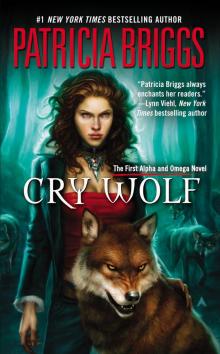 Cry Wolf
Cry Wolf On the Prowl
On the Prowl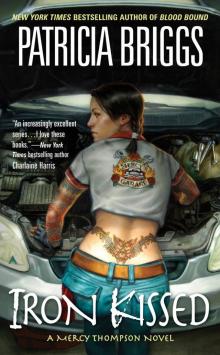 Iron Kissed
Iron Kissed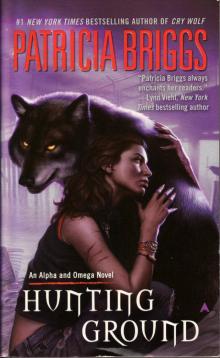 Hunting Ground
Hunting Ground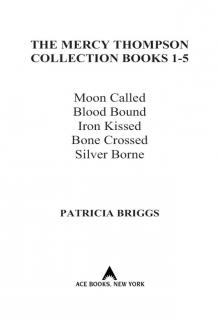 Patricia Briggs Mercy Thompson: Hopcross Jilly
Patricia Briggs Mercy Thompson: Hopcross Jilly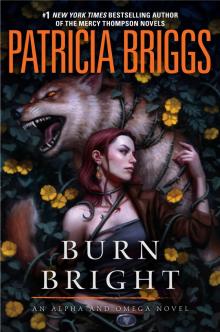 Burn Bright
Burn Bright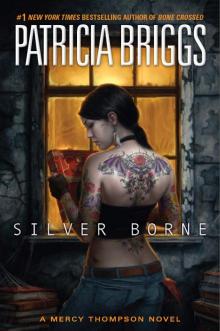 Silver Borne
Silver Borne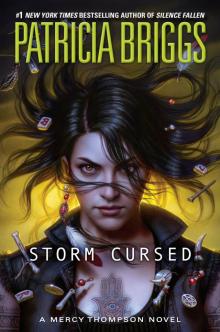 Storm Cursed
Storm Cursed Shifting Shadows
Shifting Shadows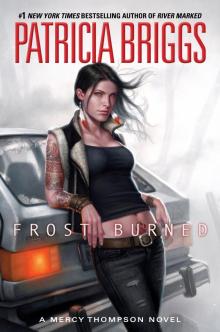 Frost Burned
Frost Burned River Marked
River Marked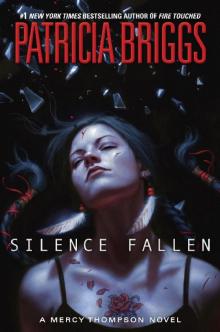 Silence Fallen
Silence Fallen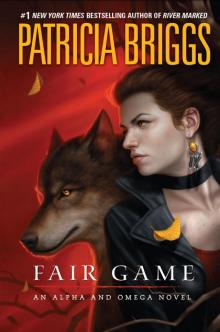 Fair Game
Fair Game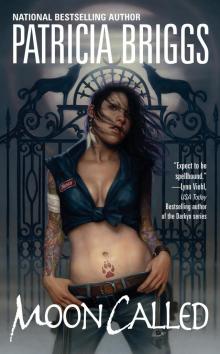 Moon Called
Moon Called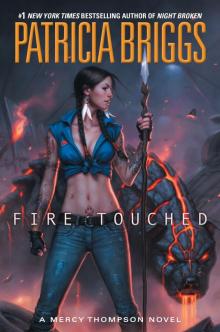 Fire Touched
Fire Touched Dead Heat
Dead Heat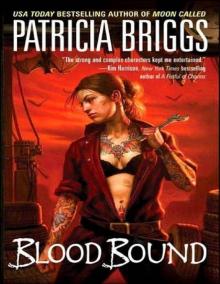 Blood Bound
Blood Bound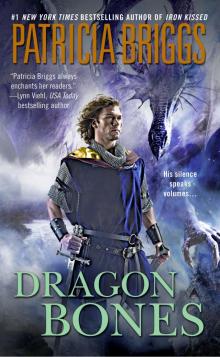 Dragon Bones
Dragon Bones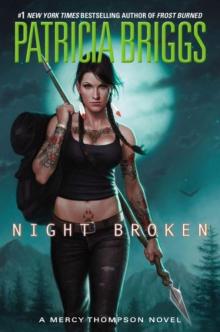 Night Broken
Night Broken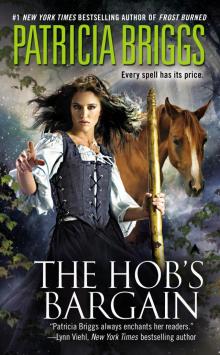 The Hobs Bargain
The Hobs Bargain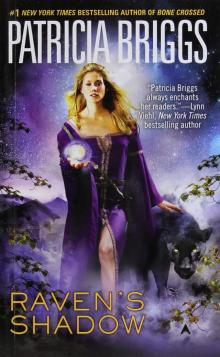 Ravens Shadow
Ravens Shadow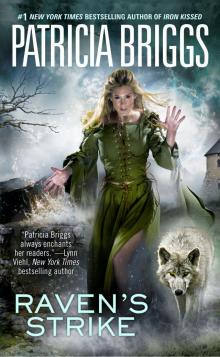 Ravens Strike
Ravens Strike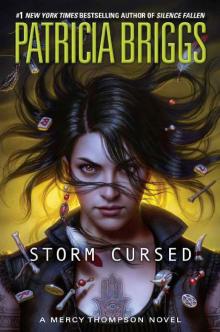 Storm Cursed (A Mercy Thompson Novel)
Storm Cursed (A Mercy Thompson Novel)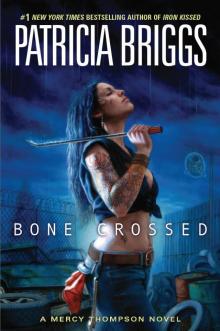 Bone Crossed
Bone Crossed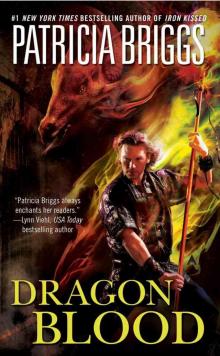 Dragon Blood
Dragon Blood Smoke Bitten: Mercy Thompson: Book 12
Smoke Bitten: Mercy Thompson: Book 12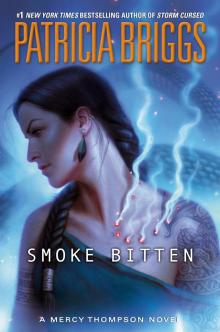 Smoke Bitten
Smoke Bitten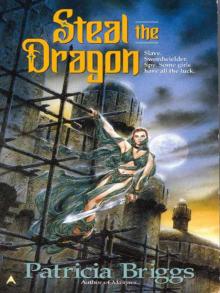 Steal the Dragon
Steal the Dragon 0.5 On The Prowl (alpha and omega)
0.5 On The Prowl (alpha and omega) Alpha and Omega
Alpha and Omega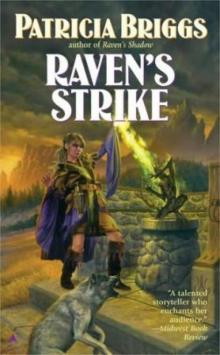 Raven's Strike rd-2
Raven's Strike rd-2![[Mercy 03] - Iron Kissed Read online](http://i1.bookreadfree.com/i/03/24/mercy_03_-_iron_kissed_preview.jpg) [Mercy 03] - Iron Kissed
[Mercy 03] - Iron Kissed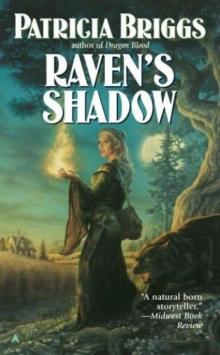 Raven's Shadow rd-1
Raven's Shadow rd-1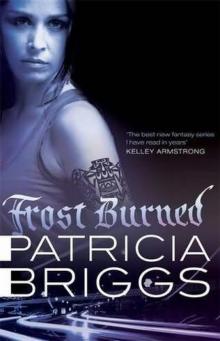 Frost Burned mt-7
Frost Burned mt-7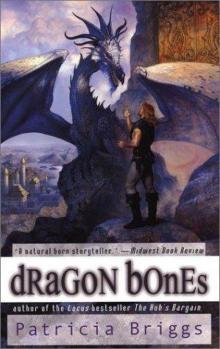 Dragon Bones h-1
Dragon Bones h-1 Shifting Shadows: Stories from the World of Mercy Thompson
Shifting Shadows: Stories from the World of Mercy Thompson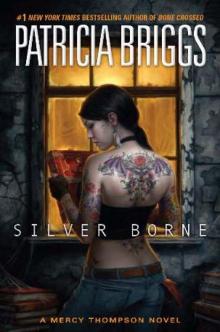 Silver Borne mt-5
Silver Borne mt-5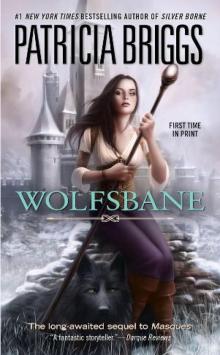 Wolfsbane s-2
Wolfsbane s-2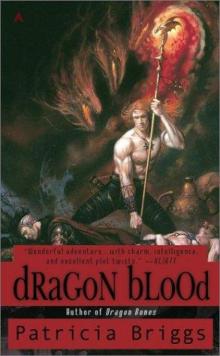 Dragon Blood h-2
Dragon Blood h-2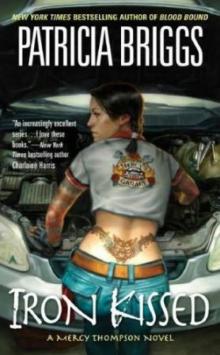 Iron Kissed mt-3
Iron Kissed mt-3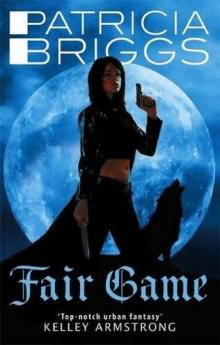 Fair Game aao-3
Fair Game aao-3 Masques s-1
Masques s-1![[Hurog 01] - Dragon Bones Read online](http://i1.bookreadfree.com/i1/04/03/hurog_01_-_dragon_bones_preview.jpg) [Hurog 01] - Dragon Bones
[Hurog 01] - Dragon Bones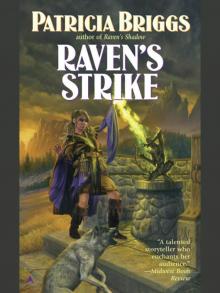 Raven s Strike
Raven s Strike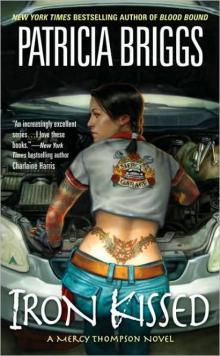 Mercedes Thompson 03: Iron Kissed
Mercedes Thompson 03: Iron Kissed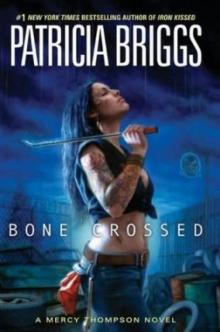 Bone Crossed mt-4
Bone Crossed mt-4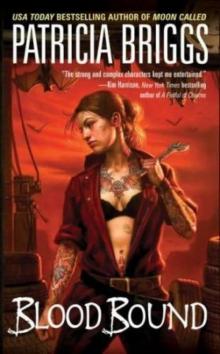 Blood Bound mt-2
Blood Bound mt-2![[Mercy 01] - Moon Called Read online](http://i1.bookreadfree.com/i2/04/09/mercy_01_-_moon_called_preview.jpg) [Mercy 01] - Moon Called
[Mercy 01] - Moon Called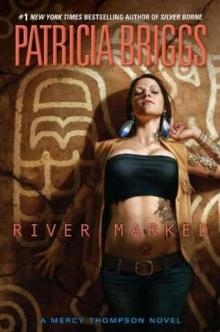 River Marked mt-6
River Marked mt-6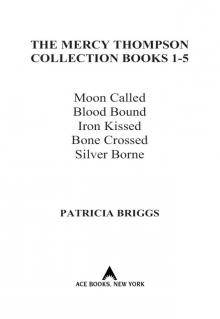 The Mercy Thompson Collection
The Mercy Thompson Collection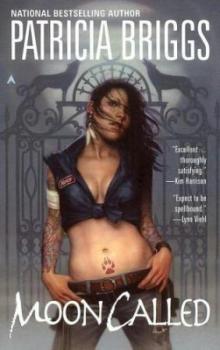 Moon Called mt-1
Moon Called mt-1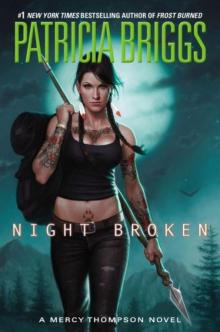 Mercy Thompson 8: Night Broken
Mercy Thompson 8: Night Broken